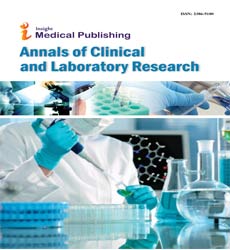Abstract
The Prevalence of Arterial Hypertension in Sample of Algerian population in Oran city: Inherited Aspect
Background: Arterial Hypertension (AH) is considered as a public health problem due to its high prevalence and difficult control and it’s also described as one of the most important risk factors for cardiovascular diseases.
Objectives: This study aimed to determine the prevalence of AH, as well as characteristics related to the presence of its inherited aspect among individuals aging between 24 and 70 years from the urban region of Oran city in Algeria.
Methods: Transversal study from January 2010 to January 2011, population- based study, of 620 participants with random sampling. For classification of AH, criteria included blood pressure (BP) ≥ 140/90 mmHg or current use of antihypertensive drugs. Individuals were interviewed with standardized questionnaires previously tested.
Results: Arterial Hypertension has a prevalence of 51.6 % in this sample of Algerian population in Oran city, which is composed of 620 individuals. Among hypertensive individuals (n= 320), mean age was 50.6 years, 73.33% was female hypertensive, 31.25% male hypertensive and 62.5% with a family history of Arterial Hypertension, among them: 46% with a maternal family history (FH), 31% with a fraternal FH, 20% with a paternal FH and 4% with a dead fraternal FH, 41% had a family history of cardiovascular disease where those with a stroke family history: 36.58% had a maternal FH, 12.19% with a paternal FH and 7.31% with a fraternal FH, 13.41% with a dead fraternal FH. Those with a family history of myocardial infarction (MI) were: 9.75% with a maternal FH of MI, 14.63% with a paternal FH, 4.86% with a fraternal FH, 2.43% with dead fraternal FH. Another characteristic of this hypertensive population is that 75% had AH associated with Type 2 Diabetes.
Conclusions: This study showed that AH represents an important public health problem with its high prevalence within this population. This result points the major role of family history of arterial hypertension and cardiovascular disease; these findings will constitute a data base for genetic studies in order to a better understanding of the gene contribution in the heritability of blood pressure.
Author(s): Amrani Asma, Sid Ahmed Chawki Lamara, Farida Mesli Talebbendieb, Mohamed bey Baba Hamed, Zoubir Ahmed Fouatih
Abstract | Full-Text | PDF
Share this

Annals of Clinical and Laboratory Research peer review process verified at publons
Abstracted/Indexed in
- Google Scholar
- Genamics JournalSeek
- China National Knowledge Infrastructure (CNKI)
- CiteFactor
- Directory of Research Journal Indexing (DRJI)
- Publons
- Secret Search Engine Labs
- Euro Pub
Open Access Journals
- Aquaculture & Veterinary Science
- Chemistry & Chemical Sciences
- Clinical Sciences
- Engineering
- General Science
- Genetics & Molecular Biology
- Health Care & Nursing
- Immunology & Microbiology
- Materials Science
- Mathematics & Physics
- Medical Sciences
- Neurology & Psychiatry
- Oncology & Cancer Science
- Pharmaceutical Sciences


